Business Law Report: Sales, Credit, and Intellectual Property
VerifiedAdded on 2020/01/28
|20
|6380
|28
Report
AI Summary
This report provides a comprehensive analysis of key business law principles. It begins with an examination of the legal rules governing the sale of goods, including implied terms, statutory provisions for property transfer and possession, and remedies for buyers and sellers. The report then delves into product liability, differentiating various types of credit agreements and analyzing termination rights and default notices. It further explores agency law, evaluating the rights and duties of agents. The report also covers monopolies, anti-competitive practices, and intellectual property rights, including patents, trademarks, and copyrights. It outlines the legal frameworks in the UK and EU, offering practical insights into real-world business scenarios and legal obligations, making it a valuable resource for students studying business law.
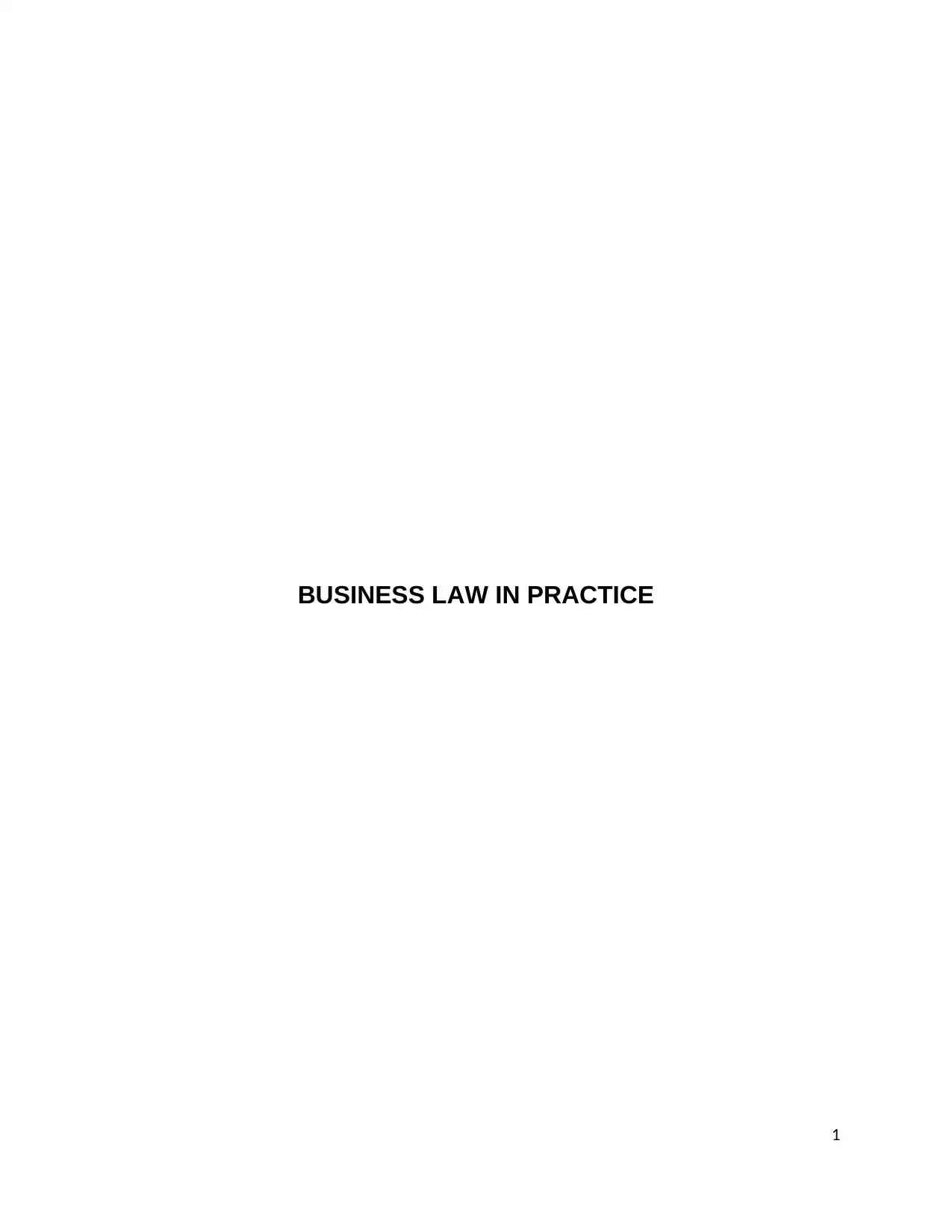
BUSINESS LAW IN PRACTICE
1
1
Paraphrase This Document
Need a fresh take? Get an instant paraphrase of this document with our AI Paraphraser
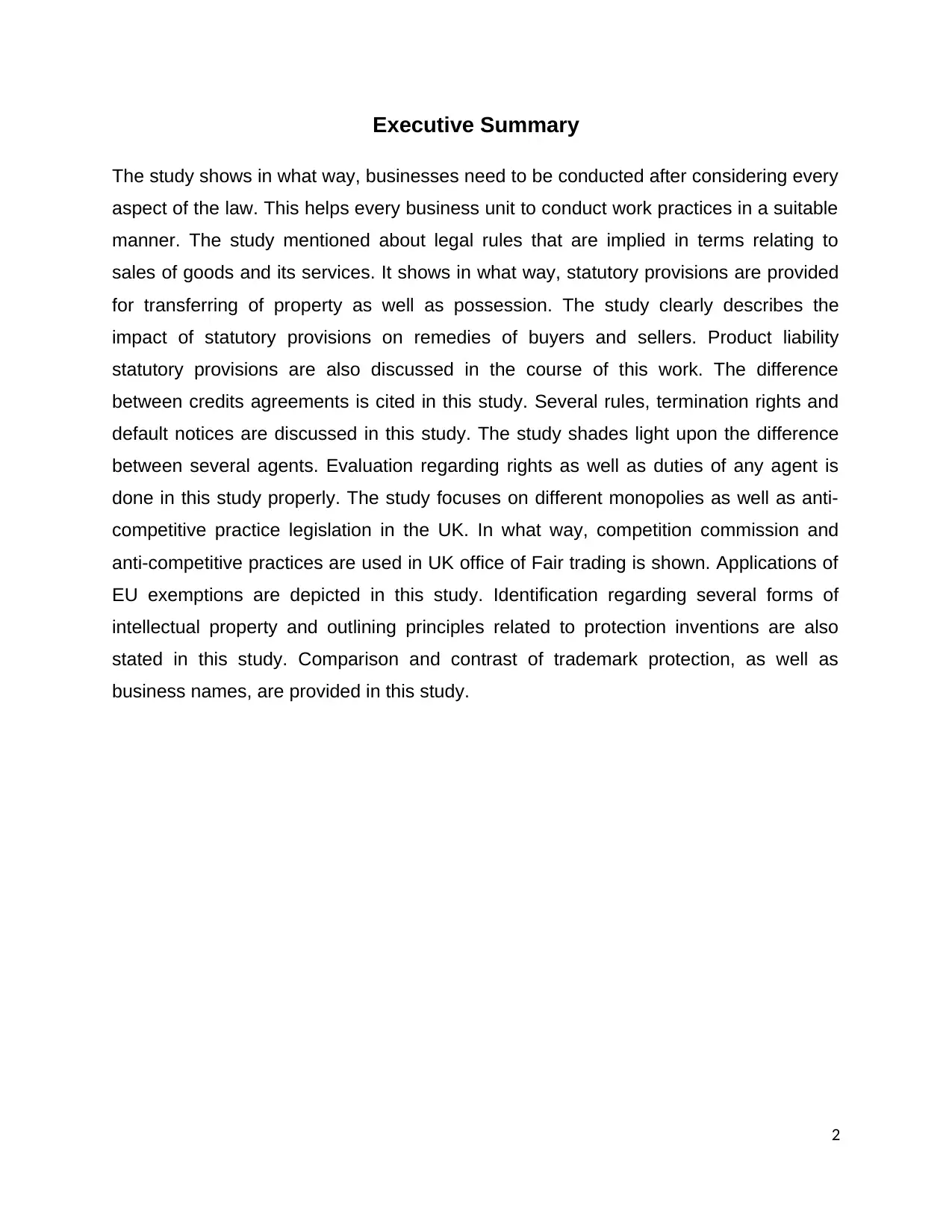
Executive Summary
The study shows in what way, businesses need to be conducted after considering every
aspect of the law. This helps every business unit to conduct work practices in a suitable
manner. The study mentioned about legal rules that are implied in terms relating to
sales of goods and its services. It shows in what way, statutory provisions are provided
for transferring of property as well as possession. The study clearly describes the
impact of statutory provisions on remedies of buyers and sellers. Product liability
statutory provisions are also discussed in the course of this work. The difference
between credits agreements is cited in this study. Several rules, termination rights and
default notices are discussed in this study. The study shades light upon the difference
between several agents. Evaluation regarding rights as well as duties of any agent is
done in this study properly. The study focuses on different monopolies as well as anti-
competitive practice legislation in the UK. In what way, competition commission and
anti-competitive practices are used in UK office of Fair trading is shown. Applications of
EU exemptions are depicted in this study. Identification regarding several forms of
intellectual property and outlining principles related to protection inventions are also
stated in this study. Comparison and contrast of trademark protection, as well as
business names, are provided in this study.
2
The study shows in what way, businesses need to be conducted after considering every
aspect of the law. This helps every business unit to conduct work practices in a suitable
manner. The study mentioned about legal rules that are implied in terms relating to
sales of goods and its services. It shows in what way, statutory provisions are provided
for transferring of property as well as possession. The study clearly describes the
impact of statutory provisions on remedies of buyers and sellers. Product liability
statutory provisions are also discussed in the course of this work. The difference
between credits agreements is cited in this study. Several rules, termination rights and
default notices are discussed in this study. The study shades light upon the difference
between several agents. Evaluation regarding rights as well as duties of any agent is
done in this study properly. The study focuses on different monopolies as well as anti-
competitive practice legislation in the UK. In what way, competition commission and
anti-competitive practices are used in UK office of Fair trading is shown. Applications of
EU exemptions are depicted in this study. Identification regarding several forms of
intellectual property and outlining principles related to protection inventions are also
stated in this study. Comparison and contrast of trademark protection, as well as
business names, are provided in this study.
2
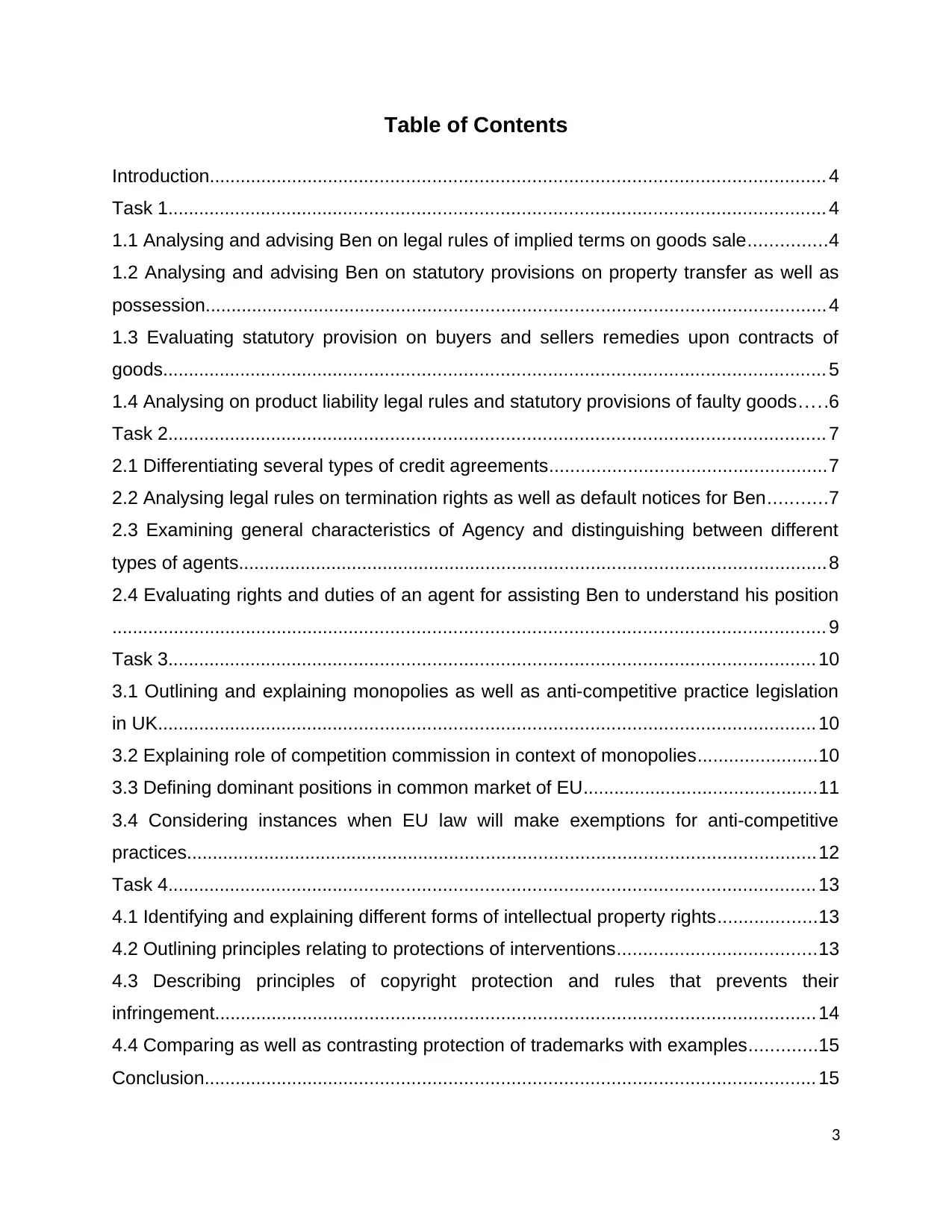
Table of Contents
Introduction...................................................................................................................... 4
Task 1.............................................................................................................................. 4
1.1 Analysing and advising Ben on legal rules of implied terms on goods sale...............4
1.2 Analysing and advising Ben on statutory provisions on property transfer as well as
possession....................................................................................................................... 4
1.3 Evaluating statutory provision on buyers and sellers remedies upon contracts of
goods............................................................................................................................... 5
1.4 Analysing on product liability legal rules and statutory provisions of faulty goods.....6
Task 2.............................................................................................................................. 7
2.1 Differentiating several types of credit agreements.....................................................7
2.2 Analysing legal rules on termination rights as well as default notices for Ben...........7
2.3 Examining general characteristics of Agency and distinguishing between different
types of agents.................................................................................................................8
2.4 Evaluating rights and duties of an agent for assisting Ben to understand his position
......................................................................................................................................... 9
Task 3............................................................................................................................ 10
3.1 Outlining and explaining monopolies as well as anti-competitive practice legislation
in UK.............................................................................................................................. 10
3.2 Explaining role of competition commission in context of monopolies.......................10
3.3 Defining dominant positions in common market of EU.............................................11
3.4 Considering instances when EU law will make exemptions for anti-competitive
practices.........................................................................................................................12
Task 4............................................................................................................................ 13
4.1 Identifying and explaining different forms of intellectual property rights...................13
4.2 Outlining principles relating to protections of interventions......................................13
4.3 Describing principles of copyright protection and rules that prevents their
infringement................................................................................................................... 14
4.4 Comparing as well as contrasting protection of trademarks with examples.............15
Conclusion..................................................................................................................... 15
3
Introduction...................................................................................................................... 4
Task 1.............................................................................................................................. 4
1.1 Analysing and advising Ben on legal rules of implied terms on goods sale...............4
1.2 Analysing and advising Ben on statutory provisions on property transfer as well as
possession....................................................................................................................... 4
1.3 Evaluating statutory provision on buyers and sellers remedies upon contracts of
goods............................................................................................................................... 5
1.4 Analysing on product liability legal rules and statutory provisions of faulty goods.....6
Task 2.............................................................................................................................. 7
2.1 Differentiating several types of credit agreements.....................................................7
2.2 Analysing legal rules on termination rights as well as default notices for Ben...........7
2.3 Examining general characteristics of Agency and distinguishing between different
types of agents.................................................................................................................8
2.4 Evaluating rights and duties of an agent for assisting Ben to understand his position
......................................................................................................................................... 9
Task 3............................................................................................................................ 10
3.1 Outlining and explaining monopolies as well as anti-competitive practice legislation
in UK.............................................................................................................................. 10
3.2 Explaining role of competition commission in context of monopolies.......................10
3.3 Defining dominant positions in common market of EU.............................................11
3.4 Considering instances when EU law will make exemptions for anti-competitive
practices.........................................................................................................................12
Task 4............................................................................................................................ 13
4.1 Identifying and explaining different forms of intellectual property rights...................13
4.2 Outlining principles relating to protections of interventions......................................13
4.3 Describing principles of copyright protection and rules that prevents their
infringement................................................................................................................... 14
4.4 Comparing as well as contrasting protection of trademarks with examples.............15
Conclusion..................................................................................................................... 15
3
⊘ This is a preview!⊘
Do you want full access?
Subscribe today to unlock all pages.

Trusted by 1+ million students worldwide
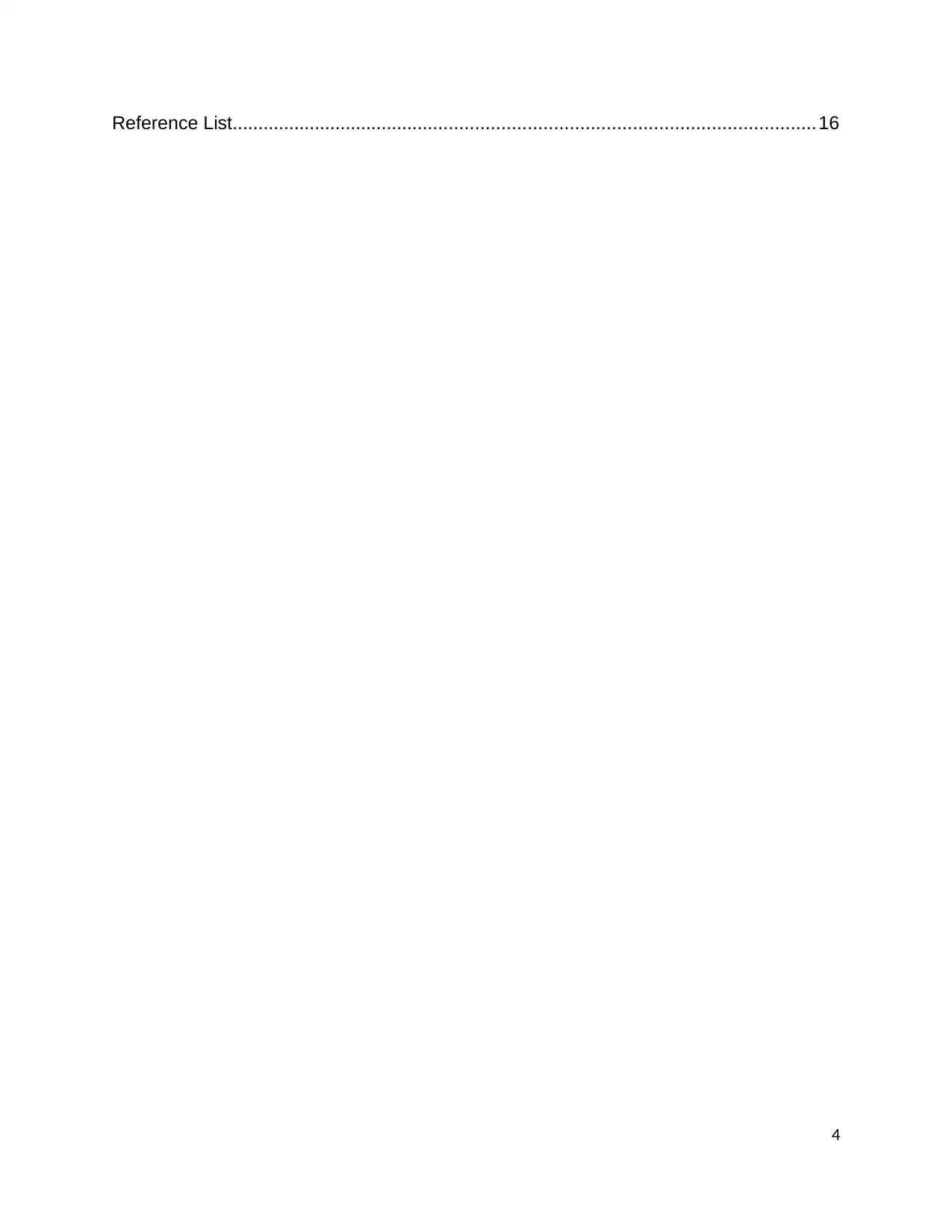
Reference List................................................................................................................ 16
4
4
Paraphrase This Document
Need a fresh take? Get an instant paraphrase of this document with our AI Paraphraser
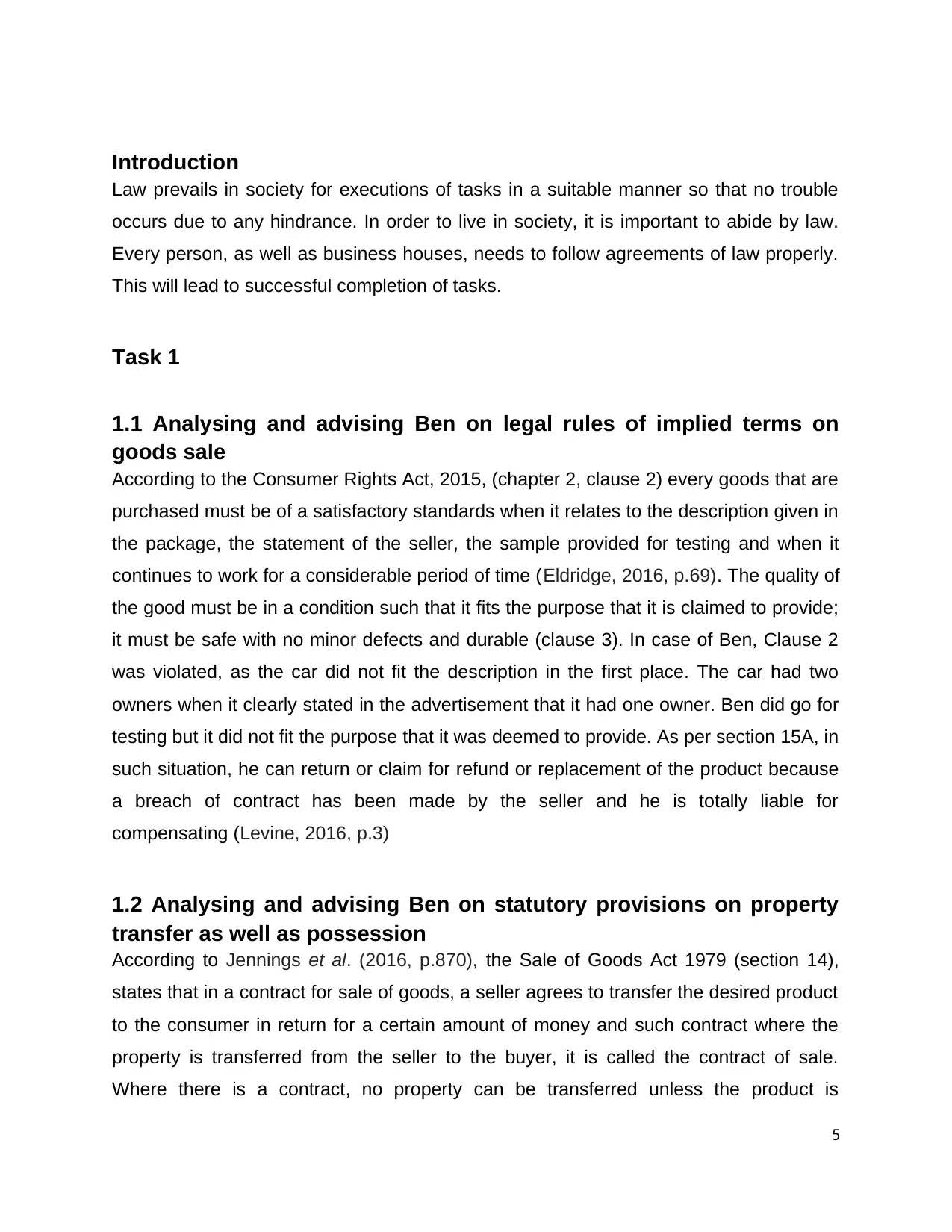
Introduction
Law prevails in society for executions of tasks in a suitable manner so that no trouble
occurs due to any hindrance. In order to live in society, it is important to abide by law.
Every person, as well as business houses, needs to follow agreements of law properly.
This will lead to successful completion of tasks.
Task 1
1.1 Analysing and advising Ben on legal rules of implied terms on
goods sale
According to the Consumer Rights Act, 2015, (chapter 2, clause 2) every goods that are
purchased must be of a satisfactory standards when it relates to the description given in
the package, the statement of the seller, the sample provided for testing and when it
continues to work for a considerable period of time (Eldridge, 2016, p.69). The quality of
the good must be in a condition such that it fits the purpose that it is claimed to provide;
it must be safe with no minor defects and durable (clause 3). In case of Ben, Clause 2
was violated, as the car did not fit the description in the first place. The car had two
owners when it clearly stated in the advertisement that it had one owner. Ben did go for
testing but it did not fit the purpose that it was deemed to provide. As per section 15A, in
such situation, he can return or claim for refund or replacement of the product because
a breach of contract has been made by the seller and he is totally liable for
compensating (Levine, 2016, p.3)
1.2 Analysing and advising Ben on statutory provisions on property
transfer as well as possession
According to Jennings et al. (2016, p.870), the Sale of Goods Act 1979 (section 14),
states that in a contract for sale of goods, a seller agrees to transfer the desired product
to the consumer in return for a certain amount of money and such contract where the
property is transferred from the seller to the buyer, it is called the contract of sale.
Where there is a contract, no property can be transferred unless the product is
5
Law prevails in society for executions of tasks in a suitable manner so that no trouble
occurs due to any hindrance. In order to live in society, it is important to abide by law.
Every person, as well as business houses, needs to follow agreements of law properly.
This will lead to successful completion of tasks.
Task 1
1.1 Analysing and advising Ben on legal rules of implied terms on
goods sale
According to the Consumer Rights Act, 2015, (chapter 2, clause 2) every goods that are
purchased must be of a satisfactory standards when it relates to the description given in
the package, the statement of the seller, the sample provided for testing and when it
continues to work for a considerable period of time (Eldridge, 2016, p.69). The quality of
the good must be in a condition such that it fits the purpose that it is claimed to provide;
it must be safe with no minor defects and durable (clause 3). In case of Ben, Clause 2
was violated, as the car did not fit the description in the first place. The car had two
owners when it clearly stated in the advertisement that it had one owner. Ben did go for
testing but it did not fit the purpose that it was deemed to provide. As per section 15A, in
such situation, he can return or claim for refund or replacement of the product because
a breach of contract has been made by the seller and he is totally liable for
compensating (Levine, 2016, p.3)
1.2 Analysing and advising Ben on statutory provisions on property
transfer as well as possession
According to Jennings et al. (2016, p.870), the Sale of Goods Act 1979 (section 14),
states that in a contract for sale of goods, a seller agrees to transfer the desired product
to the consumer in return for a certain amount of money and such contract where the
property is transferred from the seller to the buyer, it is called the contract of sale.
Where there is a contract, no property can be transferred unless the product is
5
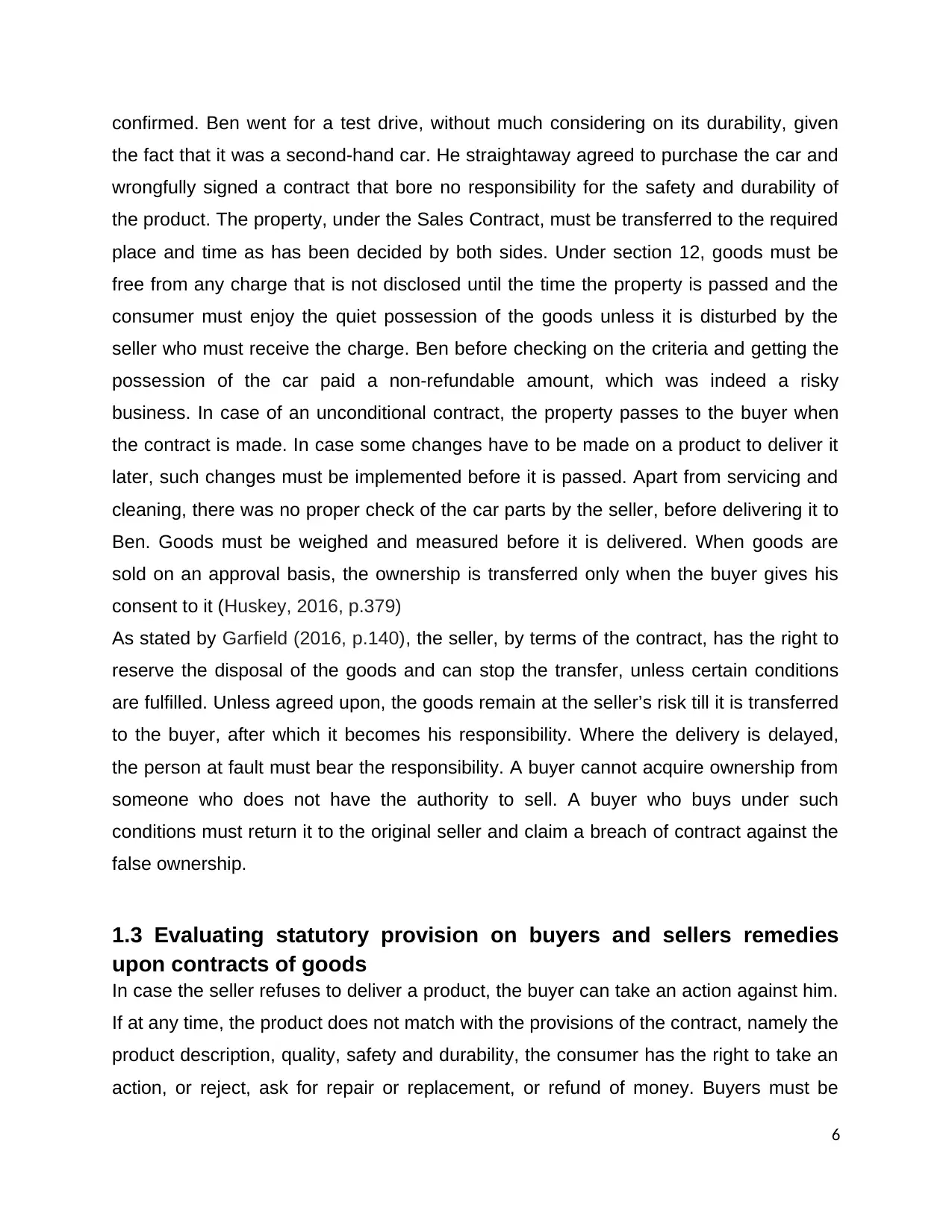
confirmed. Ben went for a test drive, without much considering on its durability, given
the fact that it was a second-hand car. He straightaway agreed to purchase the car and
wrongfully signed a contract that bore no responsibility for the safety and durability of
the product. The property, under the Sales Contract, must be transferred to the required
place and time as has been decided by both sides. Under section 12, goods must be
free from any charge that is not disclosed until the time the property is passed and the
consumer must enjoy the quiet possession of the goods unless it is disturbed by the
seller who must receive the charge. Ben before checking on the criteria and getting the
possession of the car paid a non-refundable amount, which was indeed a risky
business. In case of an unconditional contract, the property passes to the buyer when
the contract is made. In case some changes have to be made on a product to deliver it
later, such changes must be implemented before it is passed. Apart from servicing and
cleaning, there was no proper check of the car parts by the seller, before delivering it to
Ben. Goods must be weighed and measured before it is delivered. When goods are
sold on an approval basis, the ownership is transferred only when the buyer gives his
consent to it (Huskey, 2016, p.379)
As stated by Garfield (2016, p.140), the seller, by terms of the contract, has the right to
reserve the disposal of the goods and can stop the transfer, unless certain conditions
are fulfilled. Unless agreed upon, the goods remain at the seller’s risk till it is transferred
to the buyer, after which it becomes his responsibility. Where the delivery is delayed,
the person at fault must bear the responsibility. A buyer cannot acquire ownership from
someone who does not have the authority to sell. A buyer who buys under such
conditions must return it to the original seller and claim a breach of contract against the
false ownership.
1.3 Evaluating statutory provision on buyers and sellers remedies
upon contracts of goods
In case the seller refuses to deliver a product, the buyer can take an action against him.
If at any time, the product does not match with the provisions of the contract, namely the
product description, quality, safety and durability, the consumer has the right to take an
action, or reject, ask for repair or replacement, or refund of money. Buyers must be
6
the fact that it was a second-hand car. He straightaway agreed to purchase the car and
wrongfully signed a contract that bore no responsibility for the safety and durability of
the product. The property, under the Sales Contract, must be transferred to the required
place and time as has been decided by both sides. Under section 12, goods must be
free from any charge that is not disclosed until the time the property is passed and the
consumer must enjoy the quiet possession of the goods unless it is disturbed by the
seller who must receive the charge. Ben before checking on the criteria and getting the
possession of the car paid a non-refundable amount, which was indeed a risky
business. In case of an unconditional contract, the property passes to the buyer when
the contract is made. In case some changes have to be made on a product to deliver it
later, such changes must be implemented before it is passed. Apart from servicing and
cleaning, there was no proper check of the car parts by the seller, before delivering it to
Ben. Goods must be weighed and measured before it is delivered. When goods are
sold on an approval basis, the ownership is transferred only when the buyer gives his
consent to it (Huskey, 2016, p.379)
As stated by Garfield (2016, p.140), the seller, by terms of the contract, has the right to
reserve the disposal of the goods and can stop the transfer, unless certain conditions
are fulfilled. Unless agreed upon, the goods remain at the seller’s risk till it is transferred
to the buyer, after which it becomes his responsibility. Where the delivery is delayed,
the person at fault must bear the responsibility. A buyer cannot acquire ownership from
someone who does not have the authority to sell. A buyer who buys under such
conditions must return it to the original seller and claim a breach of contract against the
false ownership.
1.3 Evaluating statutory provision on buyers and sellers remedies
upon contracts of goods
In case the seller refuses to deliver a product, the buyer can take an action against him.
If at any time, the product does not match with the provisions of the contract, namely the
product description, quality, safety and durability, the consumer has the right to take an
action, or reject, ask for repair or replacement, or refund of money. Buyers must be
6
⊘ This is a preview!⊘
Do you want full access?
Subscribe today to unlock all pages.

Trusted by 1+ million students worldwide
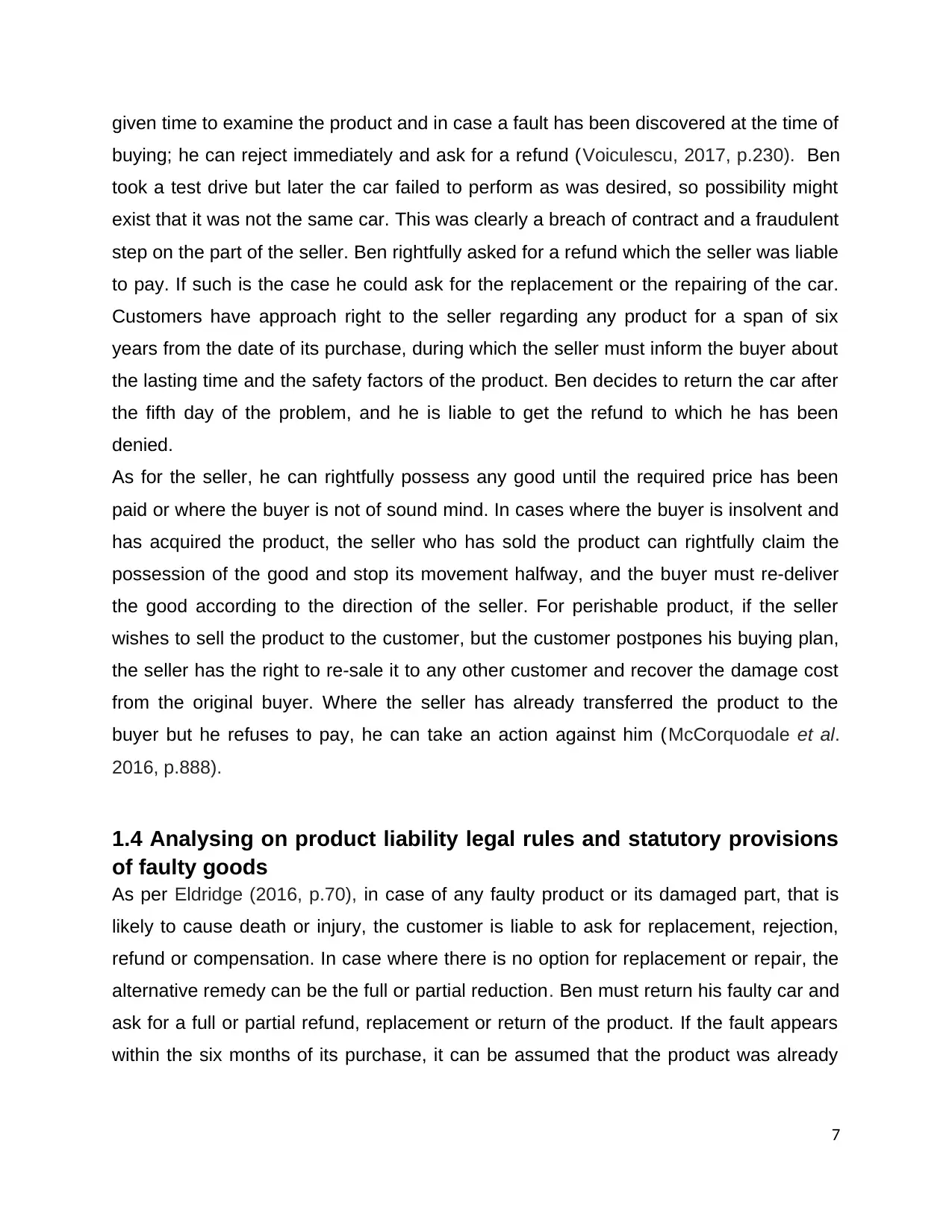
given time to examine the product and in case a fault has been discovered at the time of
buying; he can reject immediately and ask for a refund (Voiculescu, 2017, p.230). Ben
took a test drive but later the car failed to perform as was desired, so possibility might
exist that it was not the same car. This was clearly a breach of contract and a fraudulent
step on the part of the seller. Ben rightfully asked for a refund which the seller was liable
to pay. If such is the case he could ask for the replacement or the repairing of the car.
Customers have approach right to the seller regarding any product for a span of six
years from the date of its purchase, during which the seller must inform the buyer about
the lasting time and the safety factors of the product. Ben decides to return the car after
the fifth day of the problem, and he is liable to get the refund to which he has been
denied.
As for the seller, he can rightfully possess any good until the required price has been
paid or where the buyer is not of sound mind. In cases where the buyer is insolvent and
has acquired the product, the seller who has sold the product can rightfully claim the
possession of the good and stop its movement halfway, and the buyer must re-deliver
the good according to the direction of the seller. For perishable product, if the seller
wishes to sell the product to the customer, but the customer postpones his buying plan,
the seller has the right to re-sale it to any other customer and recover the damage cost
from the original buyer. Where the seller has already transferred the product to the
buyer but he refuses to pay, he can take an action against him (McCorquodale et al.
2016, p.888).
1.4 Analysing on product liability legal rules and statutory provisions
of faulty goods
As per Eldridge (2016, p.70), in case of any faulty product or its damaged part, that is
likely to cause death or injury, the customer is liable to ask for replacement, rejection,
refund or compensation. In case where there is no option for replacement or repair, the
alternative remedy can be the full or partial reduction. Ben must return his faulty car and
ask for a full or partial refund, replacement or return of the product. If the fault appears
within the six months of its purchase, it can be assumed that the product was already
7
buying; he can reject immediately and ask for a refund (Voiculescu, 2017, p.230). Ben
took a test drive but later the car failed to perform as was desired, so possibility might
exist that it was not the same car. This was clearly a breach of contract and a fraudulent
step on the part of the seller. Ben rightfully asked for a refund which the seller was liable
to pay. If such is the case he could ask for the replacement or the repairing of the car.
Customers have approach right to the seller regarding any product for a span of six
years from the date of its purchase, during which the seller must inform the buyer about
the lasting time and the safety factors of the product. Ben decides to return the car after
the fifth day of the problem, and he is liable to get the refund to which he has been
denied.
As for the seller, he can rightfully possess any good until the required price has been
paid or where the buyer is not of sound mind. In cases where the buyer is insolvent and
has acquired the product, the seller who has sold the product can rightfully claim the
possession of the good and stop its movement halfway, and the buyer must re-deliver
the good according to the direction of the seller. For perishable product, if the seller
wishes to sell the product to the customer, but the customer postpones his buying plan,
the seller has the right to re-sale it to any other customer and recover the damage cost
from the original buyer. Where the seller has already transferred the product to the
buyer but he refuses to pay, he can take an action against him (McCorquodale et al.
2016, p.888).
1.4 Analysing on product liability legal rules and statutory provisions
of faulty goods
As per Eldridge (2016, p.70), in case of any faulty product or its damaged part, that is
likely to cause death or injury, the customer is liable to ask for replacement, rejection,
refund or compensation. In case where there is no option for replacement or repair, the
alternative remedy can be the full or partial reduction. Ben must return his faulty car and
ask for a full or partial refund, replacement or return of the product. If the fault appears
within the six months of its purchase, it can be assumed that the product was already
7
Paraphrase This Document
Need a fresh take? Get an instant paraphrase of this document with our AI Paraphraser
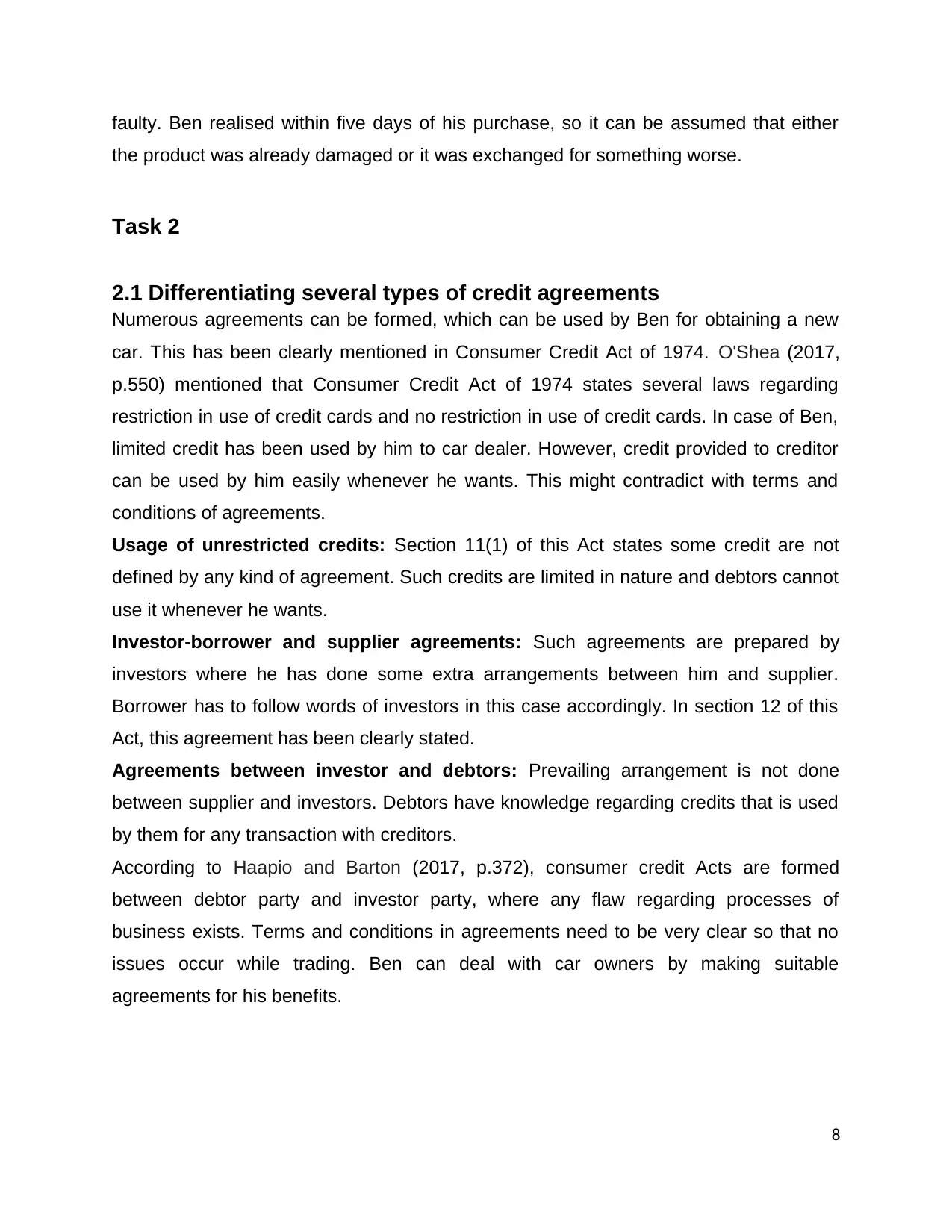
faulty. Ben realised within five days of his purchase, so it can be assumed that either
the product was already damaged or it was exchanged for something worse.
Task 2
2.1 Differentiating several types of credit agreements
Numerous agreements can be formed, which can be used by Ben for obtaining a new
car. This has been clearly mentioned in Consumer Credit Act of 1974. O'Shea (2017,
p.550) mentioned that Consumer Credit Act of 1974 states several laws regarding
restriction in use of credit cards and no restriction in use of credit cards. In case of Ben,
limited credit has been used by him to car dealer. However, credit provided to creditor
can be used by him easily whenever he wants. This might contradict with terms and
conditions of agreements.
Usage of unrestricted credits: Section 11(1) of this Act states some credit are not
defined by any kind of agreement. Such credits are limited in nature and debtors cannot
use it whenever he wants.
Investor-borrower and supplier agreements: Such agreements are prepared by
investors where he has done some extra arrangements between him and supplier.
Borrower has to follow words of investors in this case accordingly. In section 12 of this
Act, this agreement has been clearly stated.
Agreements between investor and debtors: Prevailing arrangement is not done
between supplier and investors. Debtors have knowledge regarding credits that is used
by them for any transaction with creditors.
According to Haapio and Barton (2017, p.372), consumer credit Acts are formed
between debtor party and investor party, where any flaw regarding processes of
business exists. Terms and conditions in agreements need to be very clear so that no
issues occur while trading. Ben can deal with car owners by making suitable
agreements for his benefits.
8
the product was already damaged or it was exchanged for something worse.
Task 2
2.1 Differentiating several types of credit agreements
Numerous agreements can be formed, which can be used by Ben for obtaining a new
car. This has been clearly mentioned in Consumer Credit Act of 1974. O'Shea (2017,
p.550) mentioned that Consumer Credit Act of 1974 states several laws regarding
restriction in use of credit cards and no restriction in use of credit cards. In case of Ben,
limited credit has been used by him to car dealer. However, credit provided to creditor
can be used by him easily whenever he wants. This might contradict with terms and
conditions of agreements.
Usage of unrestricted credits: Section 11(1) of this Act states some credit are not
defined by any kind of agreement. Such credits are limited in nature and debtors cannot
use it whenever he wants.
Investor-borrower and supplier agreements: Such agreements are prepared by
investors where he has done some extra arrangements between him and supplier.
Borrower has to follow words of investors in this case accordingly. In section 12 of this
Act, this agreement has been clearly stated.
Agreements between investor and debtors: Prevailing arrangement is not done
between supplier and investors. Debtors have knowledge regarding credits that is used
by them for any transaction with creditors.
According to Haapio and Barton (2017, p.372), consumer credit Acts are formed
between debtor party and investor party, where any flaw regarding processes of
business exists. Terms and conditions in agreements need to be very clear so that no
issues occur while trading. Ben can deal with car owners by making suitable
agreements for his benefits.
8
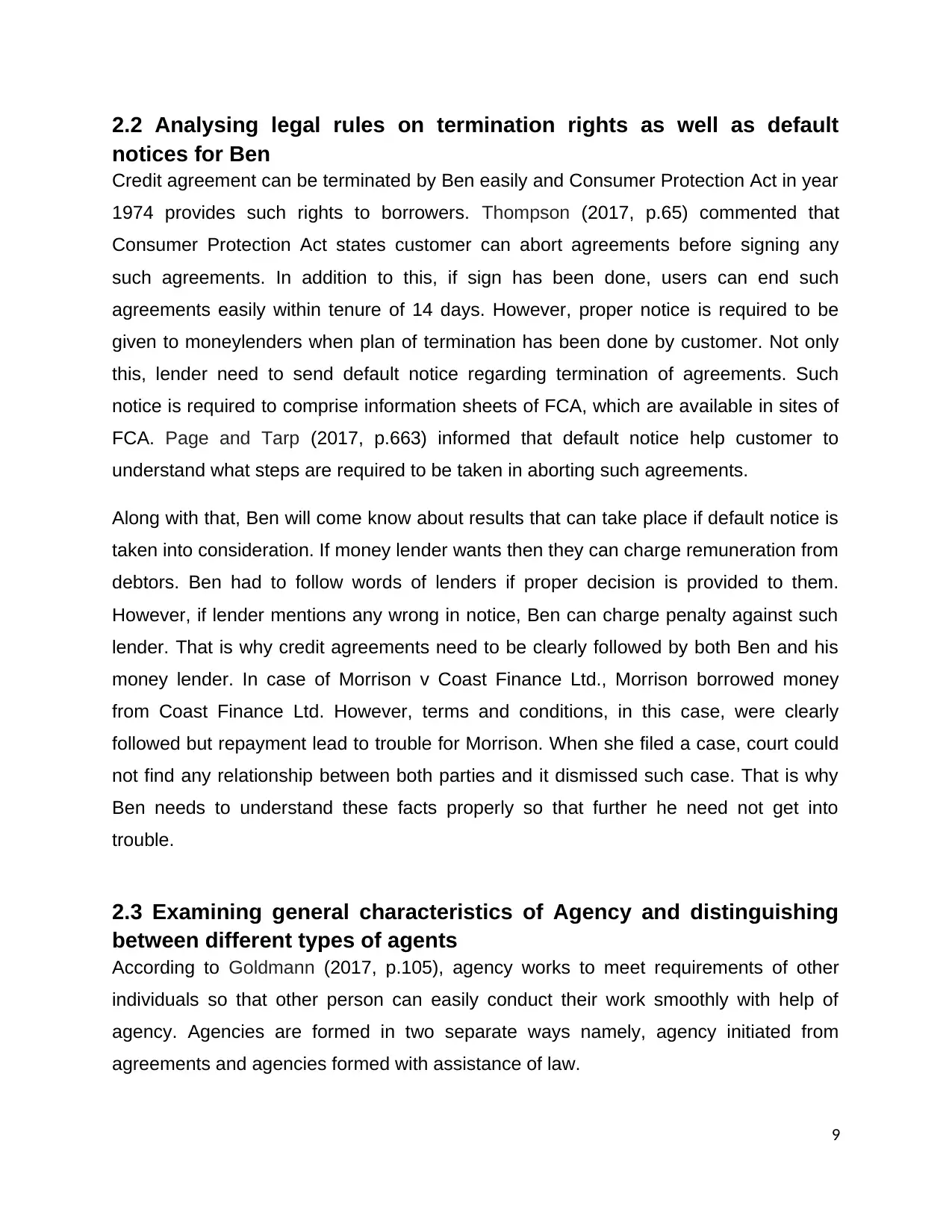
2.2 Analysing legal rules on termination rights as well as default
notices for Ben
Credit agreement can be terminated by Ben easily and Consumer Protection Act in year
1974 provides such rights to borrowers. Thompson (2017, p.65) commented that
Consumer Protection Act states customer can abort agreements before signing any
such agreements. In addition to this, if sign has been done, users can end such
agreements easily within tenure of 14 days. However, proper notice is required to be
given to moneylenders when plan of termination has been done by customer. Not only
this, lender need to send default notice regarding termination of agreements. Such
notice is required to comprise information sheets of FCA, which are available in sites of
FCA. Page and Tarp (2017, p.663) informed that default notice help customer to
understand what steps are required to be taken in aborting such agreements.
Along with that, Ben will come know about results that can take place if default notice is
taken into consideration. If money lender wants then they can charge remuneration from
debtors. Ben had to follow words of lenders if proper decision is provided to them.
However, if lender mentions any wrong in notice, Ben can charge penalty against such
lender. That is why credit agreements need to be clearly followed by both Ben and his
money lender. In case of Morrison v Coast Finance Ltd., Morrison borrowed money
from Coast Finance Ltd. However, terms and conditions, in this case, were clearly
followed but repayment lead to trouble for Morrison. When she filed a case, court could
not find any relationship between both parties and it dismissed such case. That is why
Ben needs to understand these facts properly so that further he need not get into
trouble.
2.3 Examining general characteristics of Agency and distinguishing
between different types of agents
According to Goldmann (2017, p.105), agency works to meet requirements of other
individuals so that other person can easily conduct their work smoothly with help of
agency. Agencies are formed in two separate ways namely, agency initiated from
agreements and agencies formed with assistance of law.
9
notices for Ben
Credit agreement can be terminated by Ben easily and Consumer Protection Act in year
1974 provides such rights to borrowers. Thompson (2017, p.65) commented that
Consumer Protection Act states customer can abort agreements before signing any
such agreements. In addition to this, if sign has been done, users can end such
agreements easily within tenure of 14 days. However, proper notice is required to be
given to moneylenders when plan of termination has been done by customer. Not only
this, lender need to send default notice regarding termination of agreements. Such
notice is required to comprise information sheets of FCA, which are available in sites of
FCA. Page and Tarp (2017, p.663) informed that default notice help customer to
understand what steps are required to be taken in aborting such agreements.
Along with that, Ben will come know about results that can take place if default notice is
taken into consideration. If money lender wants then they can charge remuneration from
debtors. Ben had to follow words of lenders if proper decision is provided to them.
However, if lender mentions any wrong in notice, Ben can charge penalty against such
lender. That is why credit agreements need to be clearly followed by both Ben and his
money lender. In case of Morrison v Coast Finance Ltd., Morrison borrowed money
from Coast Finance Ltd. However, terms and conditions, in this case, were clearly
followed but repayment lead to trouble for Morrison. When she filed a case, court could
not find any relationship between both parties and it dismissed such case. That is why
Ben needs to understand these facts properly so that further he need not get into
trouble.
2.3 Examining general characteristics of Agency and distinguishing
between different types of agents
According to Goldmann (2017, p.105), agency works to meet requirements of other
individuals so that other person can easily conduct their work smoothly with help of
agency. Agencies are formed in two separate ways namely, agency initiated from
agreements and agencies formed with assistance of law.
9
⊘ This is a preview!⊘
Do you want full access?
Subscribe today to unlock all pages.

Trusted by 1+ million students worldwide
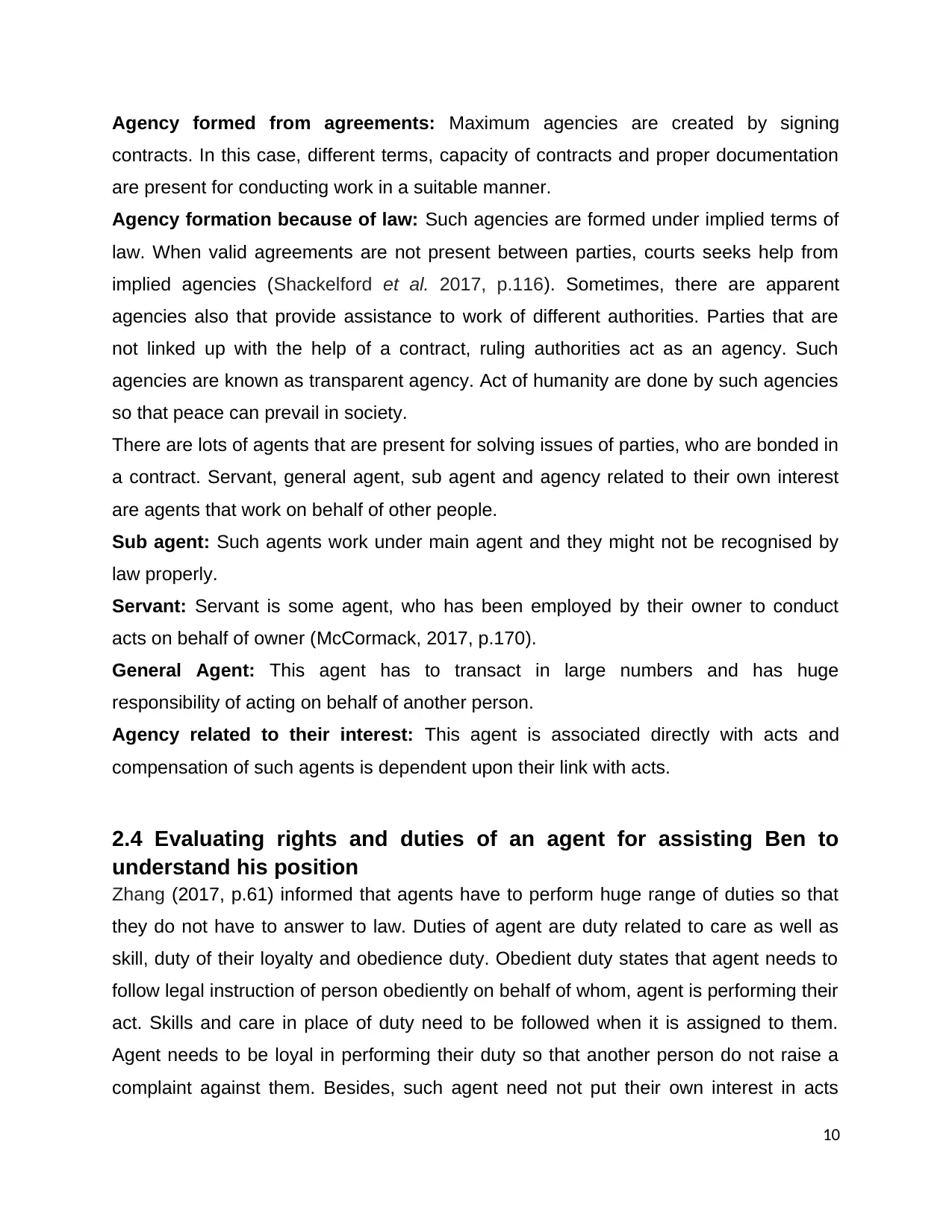
Agency formed from agreements: Maximum agencies are created by signing
contracts. In this case, different terms, capacity of contracts and proper documentation
are present for conducting work in a suitable manner.
Agency formation because of law: Such agencies are formed under implied terms of
law. When valid agreements are not present between parties, courts seeks help from
implied agencies (Shackelford et al. 2017, p.116). Sometimes, there are apparent
agencies also that provide assistance to work of different authorities. Parties that are
not linked up with the help of a contract, ruling authorities act as an agency. Such
agencies are known as transparent agency. Act of humanity are done by such agencies
so that peace can prevail in society.
There are lots of agents that are present for solving issues of parties, who are bonded in
a contract. Servant, general agent, sub agent and agency related to their own interest
are agents that work on behalf of other people.
Sub agent: Such agents work under main agent and they might not be recognised by
law properly.
Servant: Servant is some agent, who has been employed by their owner to conduct
acts on behalf of owner (McCormack, 2017, p.170).
General Agent: This agent has to transact in large numbers and has huge
responsibility of acting on behalf of another person.
Agency related to their interest: This agent is associated directly with acts and
compensation of such agents is dependent upon their link with acts.
2.4 Evaluating rights and duties of an agent for assisting Ben to
understand his position
Zhang (2017, p.61) informed that agents have to perform huge range of duties so that
they do not have to answer to law. Duties of agent are duty related to care as well as
skill, duty of their loyalty and obedience duty. Obedient duty states that agent needs to
follow legal instruction of person obediently on behalf of whom, agent is performing their
act. Skills and care in place of duty need to be followed when it is assigned to them.
Agent needs to be loyal in performing their duty so that another person do not raise a
complaint against them. Besides, such agent need not put their own interest in acts
10
contracts. In this case, different terms, capacity of contracts and proper documentation
are present for conducting work in a suitable manner.
Agency formation because of law: Such agencies are formed under implied terms of
law. When valid agreements are not present between parties, courts seeks help from
implied agencies (Shackelford et al. 2017, p.116). Sometimes, there are apparent
agencies also that provide assistance to work of different authorities. Parties that are
not linked up with the help of a contract, ruling authorities act as an agency. Such
agencies are known as transparent agency. Act of humanity are done by such agencies
so that peace can prevail in society.
There are lots of agents that are present for solving issues of parties, who are bonded in
a contract. Servant, general agent, sub agent and agency related to their own interest
are agents that work on behalf of other people.
Sub agent: Such agents work under main agent and they might not be recognised by
law properly.
Servant: Servant is some agent, who has been employed by their owner to conduct
acts on behalf of owner (McCormack, 2017, p.170).
General Agent: This agent has to transact in large numbers and has huge
responsibility of acting on behalf of another person.
Agency related to their interest: This agent is associated directly with acts and
compensation of such agents is dependent upon their link with acts.
2.4 Evaluating rights and duties of an agent for assisting Ben to
understand his position
Zhang (2017, p.61) informed that agents have to perform huge range of duties so that
they do not have to answer to law. Duties of agent are duty related to care as well as
skill, duty of their loyalty and obedience duty. Obedient duty states that agent needs to
follow legal instruction of person obediently on behalf of whom, agent is performing their
act. Skills and care in place of duty need to be followed when it is assigned to them.
Agent needs to be loyal in performing their duty so that another person do not raise a
complaint against them. Besides, such agent need not put their own interest in acts
10
Paraphrase This Document
Need a fresh take? Get an instant paraphrase of this document with our AI Paraphraser
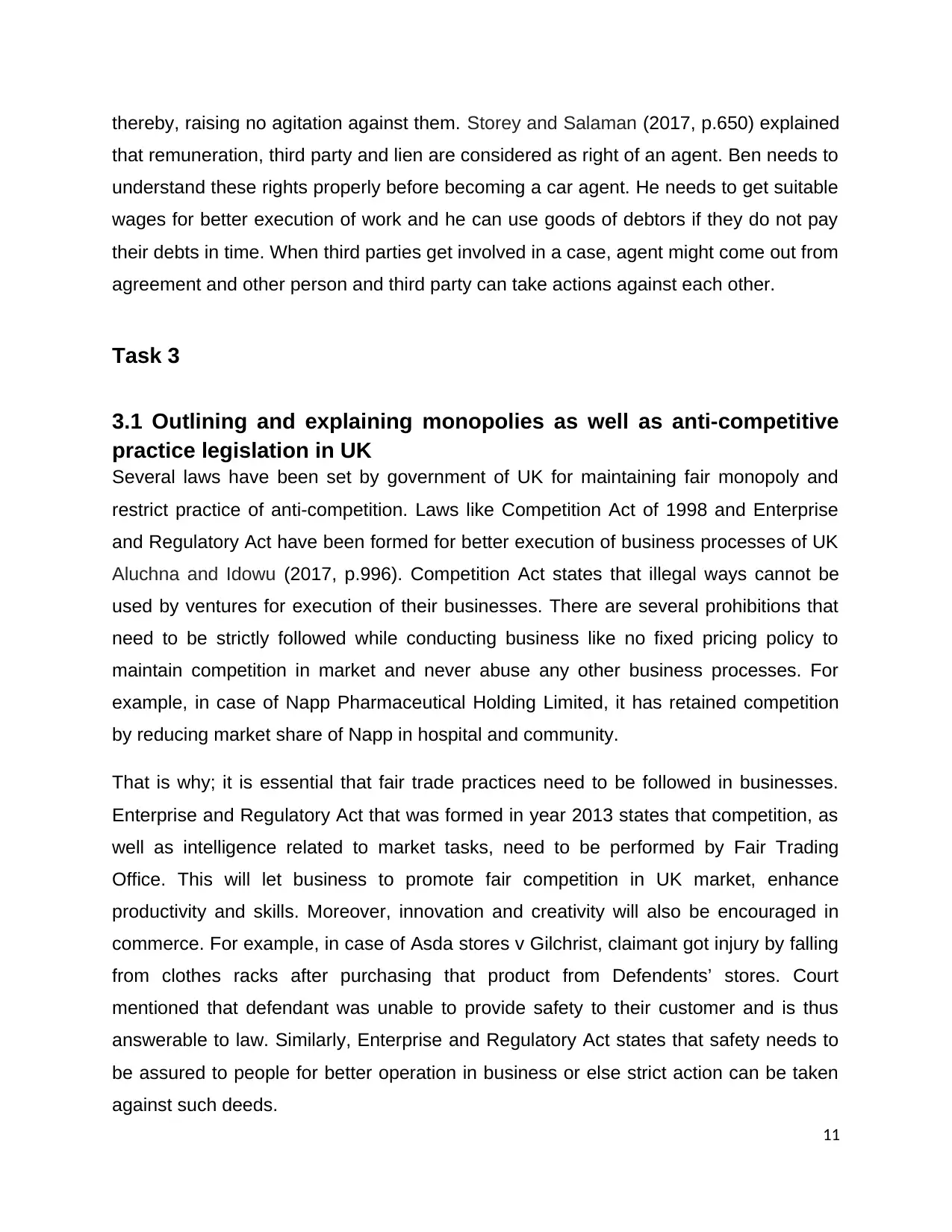
thereby, raising no agitation against them. Storey and Salaman (2017, p.650) explained
that remuneration, third party and lien are considered as right of an agent. Ben needs to
understand these rights properly before becoming a car agent. He needs to get suitable
wages for better execution of work and he can use goods of debtors if they do not pay
their debts in time. When third parties get involved in a case, agent might come out from
agreement and other person and third party can take actions against each other.
Task 3
3.1 Outlining and explaining monopolies as well as anti-competitive
practice legislation in UK
Several laws have been set by government of UK for maintaining fair monopoly and
restrict practice of anti-competition. Laws like Competition Act of 1998 and Enterprise
and Regulatory Act have been formed for better execution of business processes of UK
Aluchna and Idowu (2017, p.996). Competition Act states that illegal ways cannot be
used by ventures for execution of their businesses. There are several prohibitions that
need to be strictly followed while conducting business like no fixed pricing policy to
maintain competition in market and never abuse any other business processes. For
example, in case of Napp Pharmaceutical Holding Limited, it has retained competition
by reducing market share of Napp in hospital and community.
That is why; it is essential that fair trade practices need to be followed in businesses.
Enterprise and Regulatory Act that was formed in year 2013 states that competition, as
well as intelligence related to market tasks, need to be performed by Fair Trading
Office. This will let business to promote fair competition in UK market, enhance
productivity and skills. Moreover, innovation and creativity will also be encouraged in
commerce. For example, in case of Asda stores v Gilchrist, claimant got injury by falling
from clothes racks after purchasing that product from Defendents’ stores. Court
mentioned that defendant was unable to provide safety to their customer and is thus
answerable to law. Similarly, Enterprise and Regulatory Act states that safety needs to
be assured to people for better operation in business or else strict action can be taken
against such deeds.
11
that remuneration, third party and lien are considered as right of an agent. Ben needs to
understand these rights properly before becoming a car agent. He needs to get suitable
wages for better execution of work and he can use goods of debtors if they do not pay
their debts in time. When third parties get involved in a case, agent might come out from
agreement and other person and third party can take actions against each other.
Task 3
3.1 Outlining and explaining monopolies as well as anti-competitive
practice legislation in UK
Several laws have been set by government of UK for maintaining fair monopoly and
restrict practice of anti-competition. Laws like Competition Act of 1998 and Enterprise
and Regulatory Act have been formed for better execution of business processes of UK
Aluchna and Idowu (2017, p.996). Competition Act states that illegal ways cannot be
used by ventures for execution of their businesses. There are several prohibitions that
need to be strictly followed while conducting business like no fixed pricing policy to
maintain competition in market and never abuse any other business processes. For
example, in case of Napp Pharmaceutical Holding Limited, it has retained competition
by reducing market share of Napp in hospital and community.
That is why; it is essential that fair trade practices need to be followed in businesses.
Enterprise and Regulatory Act that was formed in year 2013 states that competition, as
well as intelligence related to market tasks, need to be performed by Fair Trading
Office. This will let business to promote fair competition in UK market, enhance
productivity and skills. Moreover, innovation and creativity will also be encouraged in
commerce. For example, in case of Asda stores v Gilchrist, claimant got injury by falling
from clothes racks after purchasing that product from Defendents’ stores. Court
mentioned that defendant was unable to provide safety to their customer and is thus
answerable to law. Similarly, Enterprise and Regulatory Act states that safety needs to
be assured to people for better operation in business or else strict action can be taken
against such deeds.
11
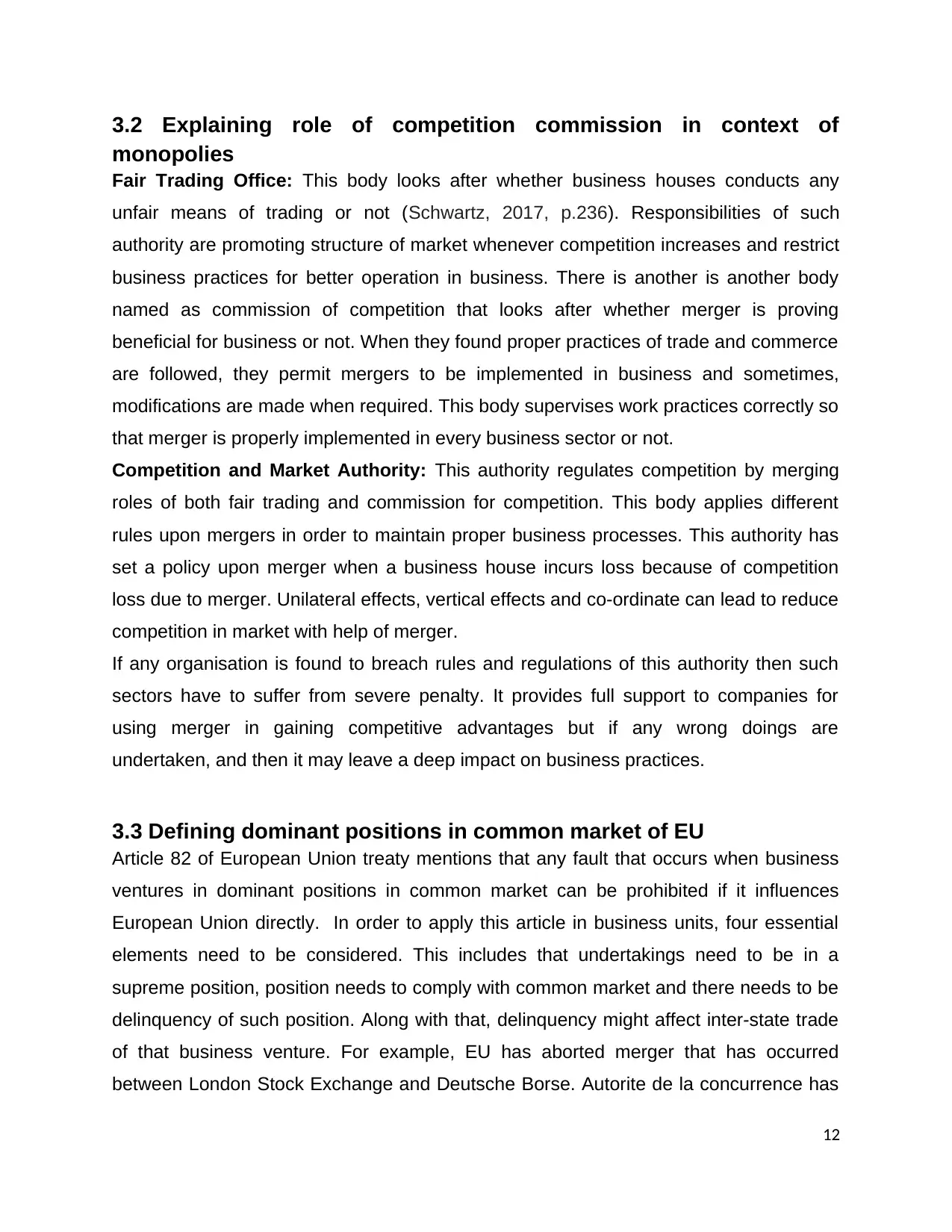
3.2 Explaining role of competition commission in context of
monopolies
Fair Trading Office: This body looks after whether business houses conducts any
unfair means of trading or not (Schwartz, 2017, p.236). Responsibilities of such
authority are promoting structure of market whenever competition increases and restrict
business practices for better operation in business. There is another is another body
named as commission of competition that looks after whether merger is proving
beneficial for business or not. When they found proper practices of trade and commerce
are followed, they permit mergers to be implemented in business and sometimes,
modifications are made when required. This body supervises work practices correctly so
that merger is properly implemented in every business sector or not.
Competition and Market Authority: This authority regulates competition by merging
roles of both fair trading and commission for competition. This body applies different
rules upon mergers in order to maintain proper business processes. This authority has
set a policy upon merger when a business house incurs loss because of competition
loss due to merger. Unilateral effects, vertical effects and co-ordinate can lead to reduce
competition in market with help of merger.
If any organisation is found to breach rules and regulations of this authority then such
sectors have to suffer from severe penalty. It provides full support to companies for
using merger in gaining competitive advantages but if any wrong doings are
undertaken, and then it may leave a deep impact on business practices.
3.3 Defining dominant positions in common market of EU
Article 82 of European Union treaty mentions that any fault that occurs when business
ventures in dominant positions in common market can be prohibited if it influences
European Union directly. In order to apply this article in business units, four essential
elements need to be considered. This includes that undertakings need to be in a
supreme position, position needs to comply with common market and there needs to be
delinquency of such position. Along with that, delinquency might affect inter-state trade
of that business venture. For example, EU has aborted merger that has occurred
between London Stock Exchange and Deutsche Borse. Autorite de la concurrence has
12
monopolies
Fair Trading Office: This body looks after whether business houses conducts any
unfair means of trading or not (Schwartz, 2017, p.236). Responsibilities of such
authority are promoting structure of market whenever competition increases and restrict
business practices for better operation in business. There is another is another body
named as commission of competition that looks after whether merger is proving
beneficial for business or not. When they found proper practices of trade and commerce
are followed, they permit mergers to be implemented in business and sometimes,
modifications are made when required. This body supervises work practices correctly so
that merger is properly implemented in every business sector or not.
Competition and Market Authority: This authority regulates competition by merging
roles of both fair trading and commission for competition. This body applies different
rules upon mergers in order to maintain proper business processes. This authority has
set a policy upon merger when a business house incurs loss because of competition
loss due to merger. Unilateral effects, vertical effects and co-ordinate can lead to reduce
competition in market with help of merger.
If any organisation is found to breach rules and regulations of this authority then such
sectors have to suffer from severe penalty. It provides full support to companies for
using merger in gaining competitive advantages but if any wrong doings are
undertaken, and then it may leave a deep impact on business practices.
3.3 Defining dominant positions in common market of EU
Article 82 of European Union treaty mentions that any fault that occurs when business
ventures in dominant positions in common market can be prohibited if it influences
European Union directly. In order to apply this article in business units, four essential
elements need to be considered. This includes that undertakings need to be in a
supreme position, position needs to comply with common market and there needs to be
delinquency of such position. Along with that, delinquency might affect inter-state trade
of that business venture. For example, EU has aborted merger that has occurred
between London Stock Exchange and Deutsche Borse. Autorite de la concurrence has
12
⊘ This is a preview!⊘
Do you want full access?
Subscribe today to unlock all pages.

Trusted by 1+ million students worldwide
1 out of 20
Related Documents
Your All-in-One AI-Powered Toolkit for Academic Success.
+13062052269
info@desklib.com
Available 24*7 on WhatsApp / Email
![[object Object]](/_next/static/media/star-bottom.7253800d.svg)
Unlock your academic potential
Copyright © 2020–2026 A2Z Services. All Rights Reserved. Developed and managed by ZUCOL.





